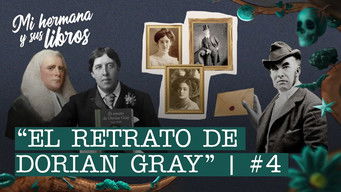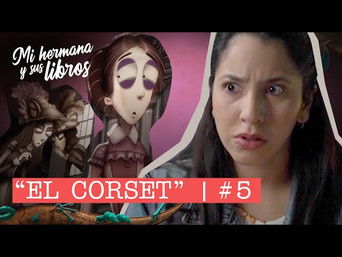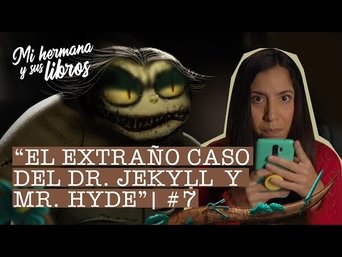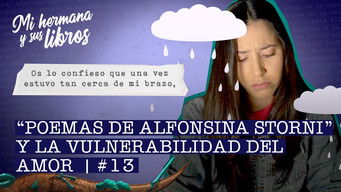Go back

"Los ojos de Judas" y la necesidad del perdón
Episode number: 1
Overview: A Diana la invade la nostalgia por las playas de Huanchaco y esto le recuerda a Laura un cuento del gran Abraham Valdelomar: “Los Ojos de judas”, la trágica historia de Luisa y de un niño con el que entabla una conexión en las playas de Pisco.

"5 metros de poemas" y la dinámica de la modernidad
Episode number: 2
Overview: A lost scholarship, a half-finished first university cycle... all of Diana's plans were frustrated by the pandemic, so Laura tries to get her out of her dramas by reciting some poems from the collection of poems “5 Meters of Poems” by the Peruvian avant-garde Carlos Oquendo de Amat. .

"Frankenstein y los dilemas de la paternidad
Episode number: 3
Overview: After a fight between Diana and her father, Laura decides to tell him a story about another father and son in conflict: “Frankenstein,” a novel by Mary Shelley that gives a twist to this type of story with a creature looking for a place in the world and only finding rejection.

"El retrato de Dorian Gray" y las ventajas de las apariencias
Episode number: 4
Overview: Diana has fallen in love with Giacomo Razzolini, a boy she met on Instagram, but this displeases Laura who believes that her sister only likes him because he is “handsome”, this makes them talk about how sometimes appearances can be deceptive. and to review the story of “The Picture of Dorian Gray.”

"El Corset" y la tortura para ser bellas
Episode number: 5
Overview: The dilemma about what to do with Diana's old dress leads the sisters to ask a very interesting question: Do we wear what we wear conditioned by others or because we really like it? Seeking to find an answer, Laura remembers a story by Clorinda Matto de Turner on a very popular feminine garment of her time: “The corset”.

"El engendro y el ciclo del año nuevo"
Episode number: 6
Overview: “I hate 2020!” Diana believes that this year ir responsible for all of her misfortunes. Could it be true? Laura remembers a story that has to do with that and leads them to question whether the years are really the culprits for what happens in them: “El engendro” by Emilia Pardo Bazán.

"El extraño caso del Dr. Jekyll y Mr. Hyde" y nuestros lados oscuros
Episode number: 7
Overview: A call upsets Diana, her friend has just been accepted at a foreign university to go on an exchange and Diana wishes that something would happen that would prevent her trip. This makes Laura remember a story that she has to do with the dark sides that we can hide: “The Strange Case of Dr. Jekyll and Mr. Hyde” by Robert Louis Stevenson.

"Poemas humanos" y la crudeza de la realidad
Episode number: 8
Overview: A volunteer experience leaves Diana very sensitive and makes her question her privileges and society's neglect of vulnerable populations. To seek to console her sister, Laura recites one of César Vallejo's poems from his book “Human Poems”

"Un grito en la noche" y el remordimiento de la inacción
Episode number: 9
Overview: A fight between her parents has Laura very worried, she had never heard them yell at each other like that and she thinks she should have done something to stop them. Talking with Diana she remembers a story that helps her with her situation: “A cry in the night” by Grazia Deledda.

"Alienación" y el rechazo a nuestra identidad
Episode number: 10
Overview: Diana has “alienated”, u know? Or at least that's what her sister Laura thinks, who sees her behavior more and more like a person from Lima. So, she tells her a story that has to do with the rejection of our identity: “Alienación” by Julio Ramón Ribeyro.

"Corazón delator" y la inescapable culpa
Episode number: 11
Overview: Mr. Lucilo, a neighbor of Diana's, has died and he blames her for treating him badly the last time they saw each other being tortured. Laura believes that her sister is exaggerating, so she tells her a story where there is a lot of guilt involved: “The Tell-Tale Heart” by Edgar Allan Poe.

"El poder de la infancia" y el ajusticiamiento social
Episode number: 12
Overview: On a visit to the market, Diana witnesses how people beat up a boy who tried to steal a sack of potatoes and this disturbs her a little. On one hand, she understands people's anger, but does that justify violence? This leads the sisters to question the punishment for crimes and talk about the story “The Power of Childhood” by Leo Tolstoy.

"Poemas de Alfonsina Stormi" y la vulnerabilidad del amor
Episode number: 13
Overview: Diana has fallen into the trap of love, but the boy she likes has fallen in love with someone else. Seeing her on the verge of tears, Laura recites some poems by Alfonsina Storni to make her come back to herself.